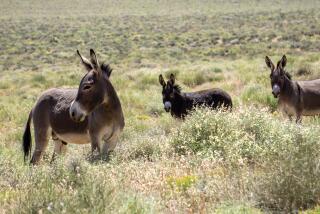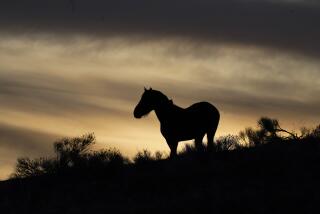Taming the Wild Horse : Cross Creek Ranch Helps Animals Captured in Roundups Find New Homes
- Share via
When Aileen and Robert Baughman of north Tustin decided to get a horse for their 12-year-old daughter, they thought adopting a wild horse might be just the ticket.
A wild horse, they reasoned, would be tougher than its domestic cousins, more sure-footed and probably better adapted to severe weather. “We like the idea--just the thought, I guess--of it coming from the wild,” Aileen Baughman said.
Having heard about recent roundups of wild horses on government lands in California and Arizona, the Baughmans figured they also might save an animal that otherwise would be destroyed.
But they also realized that accepting a wild animal, fresh from the open range, might be biting off a bit more than their daughter, Selina, could chew.
So they went to Cross Creek Ranch, in northwest Riverside County, where four unpaid, full-time workers and a couple of dozen part-time volunteers are working to save wild horses by making them suitable for adoption. Many of the horses end up at Orange County homes.
The Baughmans adopted Sunrise, an 8-month-old halter-broken chestnut filly with a white blaze, brought from the China Lake Naval Weapons Center.
“They did most of the work before we brought her home,” Aileen Baughman said. “They did a beautiful job.”
That “job” included easing Sunrise onto a domestic diet, inoculating her against diseases and getting her accustomed to being around people--not altogether easy tasks in dealing with a wild animal.
About a year ago, Barbara Eustis-Cross, who runs Cross Creek Ranch, got a call from cowboys who were rounding up horses on federal land. They asked her to take a look at some horses and burros they had corralled on the high desert.
The animals already were suffering from disease and overcrowding, Eustis-Cross recalled in a recent interview at the ranch. Many would have been shot if they did not die first.
Eustis-Cross has since taken 200 of the horses and burros home to Cross Creek, a 4 1/2-acre ranch operated by LIFE Inc., her nonprofit, tax-exempt organization devoted to animal protection and public education. (The acronym: “Life Is For Everything.”)
The Navy charges Cross Creek nothing for the animals, but caring for them and running a ranch are expensive propositions. The ranch gets no government funds, staying afloat on a trickle of private donations.
It takes Cross Creek Ranch about eight weeks--and $150 worth of feed, water and medicine--to prepare a healthy wild horse for adoption, Eustis-Cross said. The horse’s new owner pays an adoption fee, usually around $150.
Tight finances make it difficult for LIFE Inc. to expand the operation, Eustis-Cross said. The ranch now can handle only about a dozen wild horses at a time, no more than 80 in a year--far fewer than the hundreds captured each year by the Navy.
Right now, the ranch is home to six horses from the China Lake roundups. Five recent arrivals, their coats shaggy and matted, huddle in a corral and shy away whenever anyone passes too closely.
The sixth is Cinnamon, a 9-month-old sorrel with a white blaze. The young filly from China Lake follows Daun Stader, one of the ranch’s full-time hands, as any well-trained domestic animal would.
When Cinnamon arrived at the ranch last July, “she was every bit as scrummy and weak” as the five horses in the corral behind her, Eustis-Cross said.
It’s that kind of remarkable transformation that makes Cross Creek’s adoption program so successful in finding homes for the wild horses and burros.
Navy’s Specialist
“Most of the adoption programs you have, they bring the horses in, hold them in holding areas and adopt them out,” said Jerry Owens, a civilian animal specialist who watches over the roundup and adoption programs for the Navy.
Owens, who has also been involved in wild-goat roundups on San Clemente Island, heads a nationwide group called Humane Enforcement and Legal Protection, based in Brownsboro, Tex.
“If I had a choice,” he said, “I’d rather the horses be trained, or at least be halter-broken. It’s better on the horses and the people.”
That, he said, is something Cross Creek Ranch does very well. “I think it is a small, concentrated, concerted effort to take the horses and adopt them properly. . . . (Eustis-Cross) is the only one that’s doing this right now.”
The problem with other wild horse and burro adoption programs, Eustis-Cross said, is that they let people adopt the animals “loose”--without training.
Owners Often Baffled
The new owners are often unable to break and train the animals, and often don’t realize that their new “pets” are wild animals that cannot be handled as domesticated livestock.
For an adoption program to be successful, “you have to clean (the animals) up, and you have to make them a salable item,” Eustis-Cross said. “That takes money.”
And it takes attention to all sorts of details.
On their native range, for example, the wild horses graze on low-protein scrub grasses. Switching their feed abruptly to the higher-quality alfalfa hay they will eat in captivity can cause diarrhea or more severe digestive problems.
Aversion Apparent
So at Cross Creek Ranch, the horses’ feed is changed gradually to higher-protein sources, thus allowing the animals’ digestive systems time to adapt.
A wild horse’s disposition can be more difficult to adjust than its diet, Eustis-Cross said, because it isn’t accustomed to people.
As she approached the corral holding the five recent arrivals, their aversion was readily apparent. The horses moved toward the opposite corner of the square pen, their heads low and close together, their hooves nervously pawing the dirt.
The horses went into an instinctive, defensive formation, much like the circling of a wagon train against impending attack.
To a wild horse, Eustis-Cross explained, “you’re either a horse or a predator.”
If they became agitated, she said, the horses could easily kick down the metal fences or seriously injure--even kill--an offending human. “The idea of turning that loose on somebody is frightening,” she said.
Then she and two others climbed through those same fences. They planned to separate the frightened animals into three pens, a first step toward breaking down their herd instinct.
Predictable Response
But the horses responded predictably, closing ranks as the ranch hands jumped in and out of their path, trying to separate them.
In 20 minutes, though, the ranch hands had prevailed and the horses were beginning to calm down.
“The key thing--whether they’re wild or domesticated--is getting them to relax around people,” said trainer Paul Walker.
To do that, ranch workers, some of whom will adopt the horses they are training, simply spend a great deal of time with the horses. “Our volunteers will sit there for hours,” Eustis-Cross said, “feeding them and talking to them.”
According to animal-rights specialist Owens, the time and expense involved in Cross Creek’s approach makes it impractical for many other horse-adoption agencies to emulate the program. “It would be much more desirable if they could,” he said.
Expansion Difficult
With a new corral and holding pens, the ranch could process 350 horses annually, Eustis-Cross said, and with additional staffing, an even greater number. But Cross Creek’s hand-to-mouth existence makes it difficult to expand or upgrade its facilities, or to take on more wild horses.
And the lack of private donations frustrates Eustis-Cross.
“I have real short patience for humane-ers,” she said--her term for people who cry out against the slaughter of wild horses but do not contribute to adoption and preservation programs.
“They do a lot of griping and not a lot of work,” she said.
More to Read
Sign up for Essential California
The most important California stories and recommendations in your inbox every morning.
You may occasionally receive promotional content from the Los Angeles Times.










